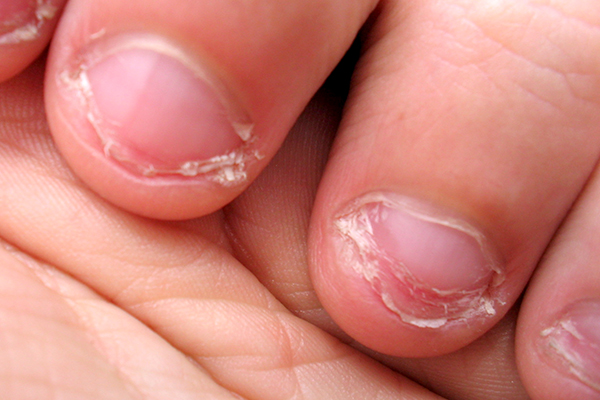

Do you find yourself compulsively chewing away your fingernails — maybe even without realizing you’re doing it? For 20 to 30% (or more), nail biting is a behavior they can’t stop on their own. Preventive medicine physician and wellness expert Sandra Darling, DO, shares when the habit warrants more than just a nail-biting deterrent polish.
Q: When is nail biting a problem that needs medical attention?
A: If nail biting causes physical harm and psychological distress, then professional treatment is necessary. Usually, the person knows the behavior is problematic, but they can’t control it on their own. It is important to seek help if the behavior is affecting mental and physical health:
- Damage to the nail, cuticle or surrounding skin.
- Bacterial infection.
- Dental concerns.
- Psychological damage (shame, low self-esteem, depression).
- Relationship problems.
Q: What’s behind chewed-to-the-nub nail biting?
A: For most people, nail biting is an occasional thing. When people can’t stop the behavior on their own, doctors consider it a type of body-focused repetitive behavior (BFRB). We refer to chronic nail biting as onychophagia and we don’t fully understand the cause (though there may be a genetic component). We do know that people with these conditions often have onychophagia as well:
- Attention deficit hyperactivity disorder (ADHD): Hyperactivity and impulsiveness, plus difficulty paying attention.
- Oppositional defiant disorder: Defiance and disobedience toward people of authority.
- Separation anxiety disorder: Excessive anxiety when separated from particular people or pets.
- Tourette syndrome: Involuntary movements and sounds.
- Other BFRBs: Chronic skin picking, hair pulling, cheek biting and grinding teeth.
Q: Are there specific triggers for onychophagia?
A: The behavior is typically automatic — people don’t realize they’re doing it. Chronic nail biting often has a self-soothing quality (it provides a sense of calm), so people may use it as a coping mechanism. Sometimes, a hangnail or nail imperfection could spur someone to excessively groom the nail. Their goal is to improve the look of the nail, but unfortunately, the nail often ends up looking worse. They don’t intend to self-harm — it’s a grooming behavior run amok. Other triggers could be boredom, needing to concentrate or a stressful situation.
Q: How do people stop biting nails?
A: Doctors classify chronic nail biting as a type of obsessive-compulsive disorder since the person has difficulty stopping. People often want to stop and make multiple attempts to quit without success. People with onychophagia cannot stop the behavior on their own, so it’s not effective to tell a loved one to stop. While you want what’s best for them, reprimanding only reinforces their feelings of being flawed. It can make someone feel worse and further fuel the behavior. With repeated effort and self-care, people can get closer to recovery. We usually recommend a combination treatment approach that includes:
- Behavioral therapy: Therapy can help release the shame and negative emotions that often accompany nail biting. It can also help increase awareness of the triggers and urges you feel. In some cases, habit-reversal training or hypnotherapy are effective.
- Self-care and relaxation: Self-care — regular meals, more movement, ample sleep — help you feel more calm, confident and resilient, giving you the strength to recover. Nail biting satisfies a strong urge, so to quiet the mind and ease the tension created by the urge, we recommend meditation, journaling and yoga.
- Social support: Talking to a support buddy when you feel the urge to bite your nails can help you get through the stressful moment. The TLC Foundation for Body-Focused Repetitive Behaviors offers a directory of support groups and educational events.
- Treatment of any psychiatric disorders: People with chronic nail biting may need medications or behavioral therapy to address a related condition.


